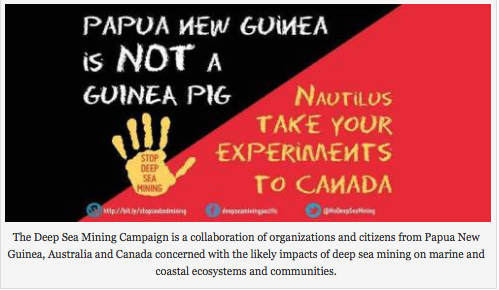Source: Papua New Guinea Mine Watch

Peter Neill – Director, World Ocean Observatory | Huffington Post | July 11, 2017
It has been some time since we’ve reflected on the issue of deep sea mining — the search for minerals of all types on the ocean floor. We have seen already how marine resources are being over-exploited — over-fishing by international fisheries being the most egregious example, mining for sand for construction projects and the creation of artificial islands, the exploitation of coral reefs and certain marine species for medical innovations and the next cure for human diseases based on understanding and synthesis of how such organisms function.
The Deep Sea Mining Campaign, an organization based in Australia and Canada, has been following the saga of Solwara 1, proposed by Nautilus Inc. for offshore Papua New Guinea that continues to seek financing year after year since 2011. The project is basically a kind of corporate speculation premised on the lucrative idea of the availability of such minerals conceptually in the region — indeed the company has declined to conduct a preliminary economic study or environmental risk assessment, the shareholders essentially engaged in a long odds probability wager comparable to those who invested in marine salvagers attempts to find and excavate “pay-ships” lost at sea with purported vast cargos of silver and gold. The idea that they should be required to justify their endeavors to governments, third-world or otherwise, or to coastwise populations whose livelihood and lives depend on a healthy ocean from which they have harvested for centuries, is anathema.
Deep Sea Mining recently reported on the recent Nautilus Annual General Meeting where CEO Michael Johnston was asked:
· Is it true that without the normal economic and feasibility studies, the economic viability of Solwara 1 is unknown?
· Is it true that the risk to shareholders of losing their entire investment in Nautilus is high and the potential returns promoted by Nautilus are entirely speculative?
· Is this why Nautilus is struggling to obtain the investment to complete the construction of its vessel and equipment?
According to the release, Johnston declined to have his responses recorded and evaded providing clear answers. He did, however, affirm the description accuracy of the Solwara 1 project in the Annual Information Forms as a ‘high’ and ‘significant’ risk.
Local communities are also not interested in the Nautilus experiment. In recent weeks, two large forums against the Solwara 1 deep sea mining project in the Bismarck Sea have been held in New Ireland and East New Britain provinces of Papua New Guinea. Supported by the Catholic Bishops and Caritas Papua New Guinea , both forums called for the halt of the Solwara 1 project and a complete ban on seabed mining in Papua New Guinea and the Pacific. Here are some comments from those meetings:
Patrick Kitaun, Caritas PNG Coordinator:
“The Bismarck Sea is not a Laboratory for the world to experiment with seabed mining. Our ocean is our life! We get all our basics from the ocean so we need to protect it. We will not allow experimental seabed mining in Papua New Guinea. It must be stopped and banned for good.”
Jonathan Mesulam of the Alliance of Solwara Warriors:
“Nautilus, we are not guinea pigs for your mining experiment! We in the Pacific are custodians of the world’s largest ocean. These oceans are important to us as sources of food and livelihoods. They are vital for our culture and our very identity. In New Ireland Province, we are only 25 km away from the Solwara 1 site. It is right in the middle of our traditional fishing grounds. We will stand up for our rights!”
Vicar General, Father Vincent Takin of the Diocese of Kavieng:
“In order, for any development to take place, the people must be the object of development and not subject to it. The people have not been fully informed about the impacts of Solwara 1 on the social, cultural, physical and spiritual aspects of their lives. Therefore they cannot give their consent.”
Nautilus Inc. does not appear to be major international energy company with the assets available to force this project forward as others might. The opposition is well organized and vocal with arguments and expectations that the company cannot overcome. We hope. As with offshore oil exploration alongshore and it the deep ocean, this project is isolated in an opposing political context and shifting market. It is not for this time, for these people in these places, who have no concern for the loss of the `stranded assets of invisible gamblers in the face of the gain of conserving and sustaining their ocean resources for local benefit and the future.
- ACTNOW's blog
- Log in to post comments
